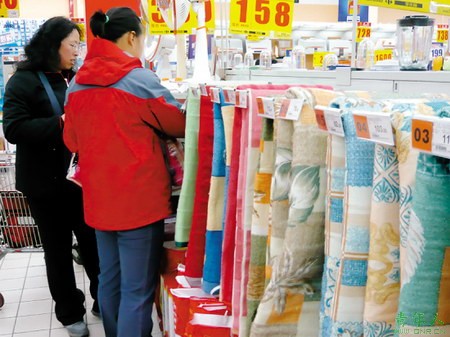
The US Department of Commerce (DOC) announced a preliminary decision Wednesday to levy anti-dumping duties on woven electric blankets imported from China.
The DOC determined that Chinese exporters have sold woven electric blankets in US at 90.32 to 174.85 percent less than their fair value.
Three companies, including Shenzhen-based Hung Kuo Electronics and two others that qualify for a separate rate were hit with a 90.32 percent anti-dumping tax. All other Chinese companies producing the blankets will have a 174.85 percent anti-dumping tax levied on them.
The DOC said in a statement it would instruct US Customs and Border Protection to collect a cash deposit or bond based on the preliminary rates.
On a petition from US woven electric blanket producer Jarden Consumer Solutions, the DOC announced its decision to initiate the anti-dumping investigation July 21, 2009. The investigation covered the period from October 1, 2008 to March 31, 2009.
The investigation included "finished, semi-finished, and unassembled woven electric blankets, including woven electric blankets commonly referred to as throws, of all sizes and fabric types, whether made of man-made fiber, natural fiber or a blend of both," the DOC said.
The DOC said imports of woven electric blankets from China increased 16.8 percent by volume from 2006 to 2008, and were valued at an estimated $29.7 million in 2008. It is scheduled to issue its final ruling in June 2010.
If the department's final ruling affirms its initial ruling, and the US International Trade Commission "makes an affirmative final ruling that imports of woven electric blankets from China materially injure, or threaten material injury" to the US' domestic industry, the department will issue an anti-dumping duty order, the DOC said.
Liu Cheng, a Beijing-based associate with DLA Piper UK LLP, told the Global Times that if the involved exporters keep exporting to US, either they or the US petitioner could apply for a review annually.
Most Chinese exporters did not defend against the litigation. A staff member surnamed Wang at the law training office of the China Chamber of Commerce for Import & Export of Textiles said the major reason is that they cannot afford legal representation in the US, particularly if they are not exporting much there.
Time is another concern. Liu said anti-dumping investigations usually last nearly a year.
The Ministry of Commerce (MOFCOM) didn't reply to an interview enquiry. Liu said the MOFCOM could raise a protest to the WTO if it believes the US is in violation of relevant WTO provisions.
MOFCOM spokesman Yao Jian said January 15 that among 115 trade remedy investigations targeted at China, value involved in US investigations account for 55 percent of the $1.27 billion total value involved in all investigations.
The US initiated 12 anti-dumping, 10 anti-subsidy and one countervailing measure investigations against Chinese producers last year, Yao said.
The DOC also announced January 21 that it would investigate charges that Chinese companies are selling oil well drill pipes in the US at unfairly low prices.
The US has 82 anti-dumping duty orders in place against a variety of Chinese goods and another 12 countervailing duty orders.
Several investigations that began in 2009 will be working their way to conclusion in the coming months.
China, complaining of protectionism, has challenged some of the duties at the WTO
责任编辑:sealion1986
